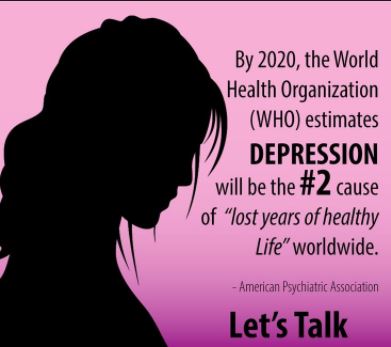
By 2020, Depression will Become the Second Leading Cause of Disease Worldwide, The World Health Organization’s Predicts
One out of ten people suffer from major depression and almost one out of five persons has suffered from this disorder during his (or her) lifetime (one-year prevalence is 10% and lifetime prevalence 17%) (Kessler et al 1994). By 2020, depression will be the second leading cause of world disability (WHO, 2001) and by 2030; it is expected to be the largest contributor to disease burden (WHO, 2008)
Source: wfmh_paper_depression_wmhd_2012.pdf
Over the years, we have followed the evolution of new knowledge and evidence.We now have a clear picture of the burden of disease arising from mental disorders. In the World Health Report 2001 that we devote to mental health, we bring updated figures which show that four of the ten leading causes of disability worldwide are neuropsychiatric disorders, accounting for 30.8% of total disability and 12.3% of the total burden of disease.This latter figure is expected to rise to 15% by the year 2020.The rise will be particularly sharp in developing countries primarily due to the projected increase in the number of individuals entering the age of risk for these disorders and as a result of social problems and unrest, including the rising number of persons affected by violent conflicts, civil wars, displacements and disasters. If we take the example of depression which is currently ranked fourth among the 10 leading causes of the global burden of disease, it is predicted that by the year 2020, it will have jumped to second place. Major depression is linked to suicide. Most people who commit suicide are also clinically depressed. If we take suicide into account, then the already huge burden associated with depression increases much more.
Source: Call_for_Action_MoH_Intro.pdf
Depression is the leading cause of ill health and disability worldwide.
30 MARCH 2017 | GENEVA – Depression is the leading cause of ill health and disability worldwide. According to the latest estimates from WHO, more than 300 million people are now living with depression, an increase of more than 18% between 2005 and 2015. Lack of support for people with mental disorders, coupled with a fear of stigma, prevent many from accessing the treatment they need to live healthy, productive lives.
The new estimates have been released in the lead-up to World Health Day on 7 April, the high point in WHO’s year-long campaign “Depression: let’s talk”. The overall goal of the campaign is that more people with depression, everywhere in the world, both seek and get help.
Said WHO Director-General, Dr Margaret Chan: “These new figures are a wake-up call for all countries to re-think their approaches to mental health and to treat it with the urgency that it deserves.”
One of the first steps is to address issues around prejudice and discrimination. “The continuing stigma associated with mental illness was the reason why we decided to name our campaign Depression: let’s talk,” said Dr Shekhar Saxena, Director of the Department of Mental Health and Substance Abuse at WHO. “For someone living with depression, talking to a person they trust is often the first step towards treatment and recovery.”
Associated health risks
WHO has identified strong links between depression and other noncommunicable disorders and diseases. Depression increases the risk of substance use disorders and diseases such as diabetes and heart disease; the opposite is also true, meaning that people with these other conditions have a higher risk of depression.
Depression is also an important risk factor for suicide, which claims hundreds of thousands of lives each year. Said Dr Saxena: “A better understanding of depression and how it can be treated, while essential, is just the beginning. What needs to follow is sustained scale-up of mental health services accessible to everyone, even the most remote populations in the world.”
Depression is a common mental illness characterized by persistent sadness and a loss of interest in activities that people normally enjoy, accompanied by an inability to carry out daily activities, for 14 days or longer.
In addition, people with depression normally have several of the following: a loss of energy; a change in appetite; sleeping more or less; anxiety; reduced concentration; indecisiveness; restlessness; feelings of worthlessness, guilt, or hopelessness; and thoughts of self-harm or suicide.
Source: http://www.who.int/mediacentre/news/releases/2017/world-health-day/en/
If you are suffering these, please seek help.







